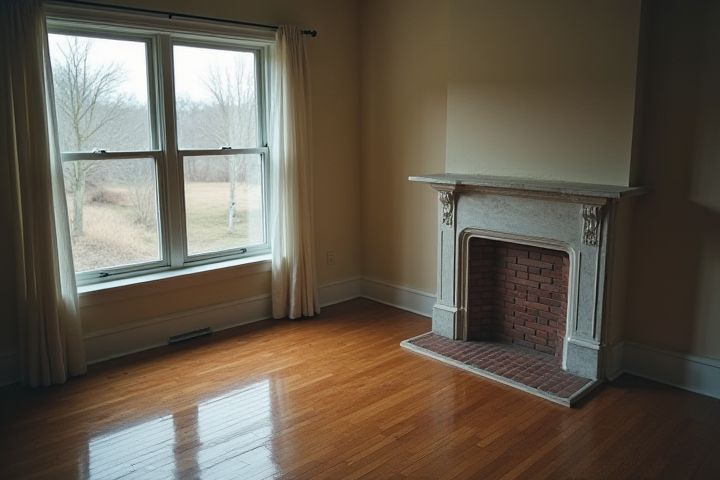
Leaving a house empty is feasible, but it requires careful consideration of various factors. Ensuring the property is secure is vital, including locking doors and windows and possibly installing security systems or cameras. Regular maintenance, such as checking for leaks or pests, can prevent issues that may arise from prolonged vacancy. It's also prudent to notify utility companies and consider forwarding your mail to prevent any identity theft. You may want to enlist a trusted neighbor or friend to check on the house occasionally, maintaining its condition and deterring potential intruders.
Can You Leave A House Empty
Home insurance implications
Leaving a house empty for an extended period, typically over 30 consecutive days, can significantly affect your home insurance coverage. Most standard home insurance policies may provide limited or no coverage for theft, vandalism, or damage due to plumbing failures during that time. You may need to notify your insurer to maintain your coverage, or consider obtaining a vacant home insurance policy, which can cost between 1.5 to 3 times more than standard coverage. Always review your specific policy terms, as failure to inform your insurer could result in denied claims, leaving you financially vulnerable.
Security risks
Leaving a house empty for an extended period significantly increases security risks, as unoccupied homes are prime targets for burglars. In fact, studies show that homes without apparent security measures are 300% more likely to be burgled. Your absence can also amplify other vulnerabilities, such as unnoticed maintenance issues that may lead to further complications. Installing a security system or utilizing home monitoring services can deter criminal activities and provide peace of mind while you're away.
Maintenance concerns
Leaving a house empty can lead to significant maintenance concerns, primarily if it remains unmonitored for extended periods. Water leaks can develop unnoticed, potentially causing structural damage, fostering mold growth, and resulting in costly repairs. Pests, including rodents and termites, may infiltrate an empty home, leading to infestations that compromise the integrity of the property. Regular inspections, along with proper heating and ventilation, are essential to mitigate these risks and ensure the house remains in good condition.
Utility management
Leaving a house empty can significantly impact utility management, particularly as energy costs fluctuate. To maintain efficiency, consider setting your thermostat between 50degF and 65degF in winter to prevent pipe burst, while summer settings around 78degF can help minimize cooling expenses. Unplugging appliances not in use saves an estimated 10% on your electric bill, ensuring that phantom loads don't drive up your costs. Furthermore, schedule periodic checks of plumbing systems to avoid leaks, which can waste up to 1,000 gallons of water a month.
Legal requirements
Leaving a house empty can trigger specific legal requirements such as notifying your local authority, especially if the property will remain unoccupied for an extended period, often exceeding 30 days. It's essential to maintain the property to prevent legal issues related to vandalism or squatters, which could lead to costly disputes. Some jurisdictions may impose a higher council tax rate for empty homes, with rates potentially increasing as high as 200% in certain areas. Before vacating, check your homeowners' insurance policy to ensure coverage still applies while the house remains unoccupied, as some policies may require additional premiums or restrictions.
Property depreciation
Leaving a house empty can significantly accelerate property depreciation, as ongoing maintenance neglect leads to deterioration and disrepair. Factors such as weather exposure, pest infestations, and vandalism can further diminish the property's value over time. Moreover, an unoccupied home often lacks the curb appeal that attracts potential buyers or renters, further impacting marketability. To preserve your investment, it's crucial to implement regular inspections and upkeep even in absence of occupants.
Pest infestations
Leaving your house empty for an extended period can create favorable conditions for pest infestations. Common intruders such as rodents, termites, and cockroaches thrive in unattended environments, often leading to expensive damage and a compromised living space. For instance, a single pair of house mice can produce up to 60 offspring in a year, making quick work of your empty home. To mitigate risks, consider pest control measures before leaving, like sealing entry points and using traps or deterrents.
Vandalism and theft potential
Leaving a house empty significantly increases the risk of vandalism and theft, attracting opportunistic criminals. Studies indicate that vacant properties are 30% more likely to experience break-ins compared to occupied homes. You should consider implementing security measures, such as installing surveillance cameras and motion-sensor lights, as homes with visible security features detour potential intruders. Additionally, maintaining the appearance of occupancy, like using timers for lights, can help mitigate the risks associated with an uninhabited property.
Yard and garden upkeep
Leaving a house empty can lead to overgrown lawns and neglected gardens, impacting curb appeal and potentially lowering property value. Regular maintenance for yards involves mowing grass every one to two weeks during the growing season and keeping weeds under control through mulching or herbicidal treatments. In gardens, it's essential to water plants at least once a week, ensuring they receive about one inch of water, while deadheading flowers promotes continued blooming. You might consider hiring a landscaping service or enlisting a neighbor to perform these tasks, thereby preserving the aesthetic and health of your outdoor spaces.
Neighbor relations
Leaving a house empty can significantly impact neighbor relations, as it may lead to increased concerns about security and maintenance. Unattended properties can attract pests, create safety hazards, or even draw unwanted attention, which could affect your neighbors' comfort. For instance, long grass or unchecked debris may diminish the neighborhood's overall aesthetic, leading to potential conflict. Ensuring open communication with your neighbors regarding your absence and arranging for regular property checks can foster goodwill and maintain positive relationships.
